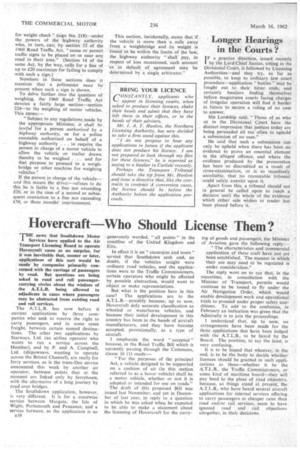Hovercraft Who Should License Them?
Page 72

If you've noticed an error in this article please click here to report it so we can fix it.
THE news that Southdown Motor Services have applied to the Air Transport Licensing Board to operate Hovercraft came as no surprise, for it was inevitable that, sooner or later, applications of this sort would be made by companies primarily concerned with the carriage of passengers by road. But questions are being asked in road and rail passengercarrying circles about the wisdom of the A.T.L.B. being allowed to adjudicate in cases where passengers may be abstracted from existing road and rail services.
The A.T.L.B. has now before it current applications by three companies who seek to reserve the right to carry passengers, and in some cases freight, between certain named destinations. The other two applications by Starways, Ltd. (an airline operator who wants to run a service across the Humber), and by P. and A. Campbell, Ltd. (shipowners, wanting to operate across the Bristol Channel), are really for ferry services, as is the trans-Dee service announced this week by another air operator, between points that at. the moment are linked only by ferryboats, with the alternative of a long journey by road over bridges.
The Southdown application, however, is very different. It is for a coastwise service between Margate, the Isle of Wight, Portsmouth and Penzance, and a service between, as the application is so B311 generously worded, "all points" in the coastline of the United Kingdom and Eire.
In effect it is an "excursion and tours" service that Southdown seek and, no doubt, if the vehicles sought were ordinary road vehicles, and the applications were to the Traffic Commissioners, certain operators who might be affected by possible abstraction, would want to object or make representations.
But what is the position here in this case? The applications are to the A.T.L.B.—possibly because, up to now, Hovercraft defy accurate classification as wheeled or waterborne vehicles, and because their initial development in this country has been in the hands of aircraft manufacturers, and they have become accepted, provisionally, as a type of aircraft.
I emphasize the word " accepted " because, in the Road Traffic Bill which is currently passing through the Commons, clause 16 (I) reads:—
" For the purposes of the principal Act, a vehicle designed to be supported on a cushion of air (in this section referred to as a hover vehicle) shall be a motor vehicle, whether or not it is adapted or intended for use on roads." The draft of this proposed pill was
issued last November, and yet in Decem ber of last year, in reply to a question in which he was asked when he expected to be able to make a statement about the licensing of Hovercraft for the carry
ing of goods and passengers, the Minister s of Aviation gave the following reply:— " The characteristics and commercial application of these craft have not yet been established. The manner in which their use may need to be regulated is
under consideration." _ The reply went on to say that, in the meantime, in consultation with the Minister of Transport, permits would continue to be issued to fly under the Air Navigation Order, which would enable development work and operational trials to proceed under proper safety conditions. To add to the confusion, in February an indication was given that the Admiralty is to join the proceedings.
I understand that, tip to now, no arrangements have been made for the three applications that have been lodged with the A.T.L.B., to be heard by the Board. The position, to say the least, is very confusing.
It is to be hoped that whoever, in the end, is to be the body to decide whether licences should be granted in such applications as these—whether it be the A.T.L.B., the Traffic Commissioners, or some kind of maritime board—they will pay heed to the pleas of road objectors, because, as things stand at present, the A.T.L.B., who have heard several aircraft applications for internal services offering to carry passengers at cheaper rates than road and/or rail services, seem to have ignored road and rail objections altogether, in their decisions.




















































































































